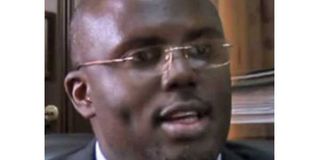Government transfers 200 tutors

Spoken. Mr Patrick Muinda, the Ministry of Education spokesperson. FILE PHOTO
For the first time in 30 years, government has moved at least 183 tutors in Primary Teachers’ Colleges in a bid to improve service delivery in the institutions.
According to Mr Patrick Muinda, the Ministry of Education spokesperson, the transfers took into account those who had personally requested but the majority were those who had overstayed at their duty station for more than 10 years.
“When people have been in a place for a long time, they get used to and lax. It is healthy to rotate them so that they can know other places, be exposed and grow their career. There are those who are transferred as a disciplinary measure because they no longer listen to their supervisors and are leading students to strike. But also as a policy, a teacher needs to be changed after five years,” Mr Muinda said yesterday in an interview.
Besides the transfers, the ministry is doing a number of reforms, including implementing the teacher policy that was enacted last year to guide the teachers and stakeholders in providing quality education to the country.
Reforms in the ministry
The transfers are among the various reforms that the ministry is undertaking following complaints from stakeholders that children and their teachers were unable to read and count. There have also been reports of unprofessionalism on the part of some teachers.
While releasing the 2018 Primary Leaving Examinations (PLE), Prof Mary Okwakol, the Uganda National Examinations Board (Uneb) chairperson, said although the board had managed to reduce malpractices, their challenge was still the assistance given to the pupils by their teachers during the examinations.
“The main challenge is assistance given by teachers to candidates in form of answers written on chits and sent into examination rooms for candidates to copy. In extreme cases, teachers have been found reading answers to candidates in examination rooms like in the case of eight schools in Bundibugyo district,” Prof Okwakol said last month.
In 2016, Uneb reported that 80 per cent of primary teachers could hardly read and do an arithmetic of a Primary Six level.
They cited that only 18.8per cent of the primary teachers’ tutors could interpret graphs compared to their 5.7 per cent final year students subjected to the same task. This meant that 81.2 per cent of the tutors could not interpret the graphs and so were 94.3 per cent of their students.
The teachers who were already in the field could not do any better after they scored 8 per cent in interpreting the graphs.
The questions on number patterns and sequences were equally done poorly by the teachers with 8.8 per cent of the trainee teachers rated proficient, 31.2 per cent in service teachers able to count as compared to 38.8 per cent of their tutors.
Uneb’s Executive Secretary, Mr Daniel Odongo, said the findings were alarming and should interest every stakeholder to get involved in improving the learning and teaching of their children.
“Only 21.8 per cent and 38.8 per cent of Primary Teachers Colleges Year Two students were rated proficient in numeracy and literacy in English language respectively. These low results should be cause for worry because these students are now in the field teaching our children,” Mr Odongo said while releasing the 2015 National Assessment of Progress in Education (NAPE) assessment.
Mr Muinda said they were optimistic that the affected tutors would learn new skills and improve their methodologies while they unlearn poor teaching practices at their new stations. He asked those who were not affected to pick up the good practices from the new tutors to improve service delivery.




